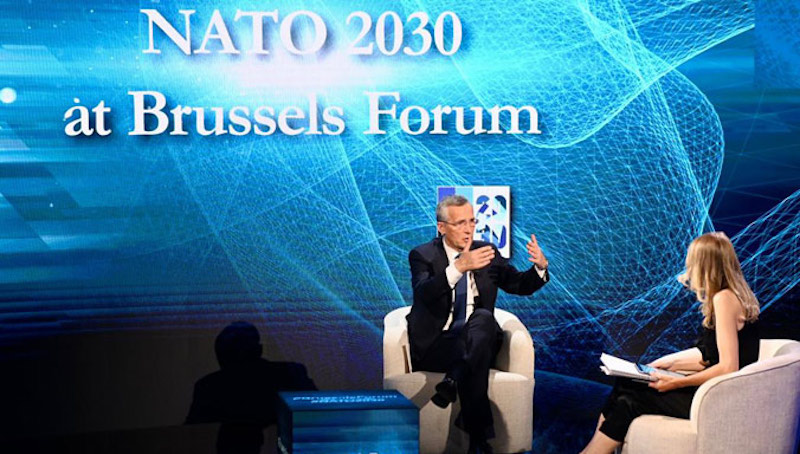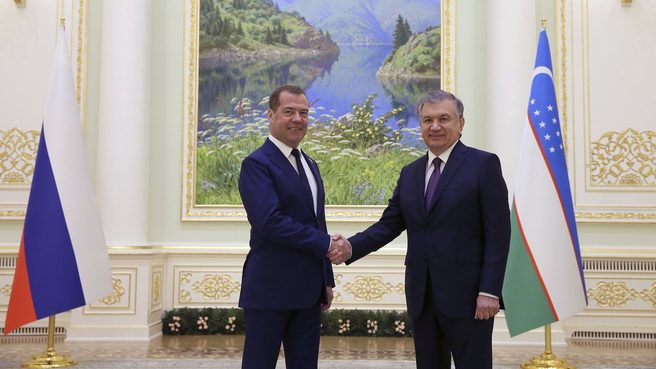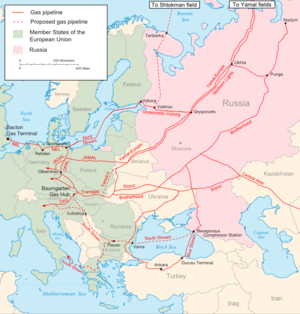In June 2021, NATO members met at NATO Headquarters in Brussels to discuss joint plans to tackle some of the most significant problems of our time. The meeting was jointly hosted with representatives from the German Marshall Fund of the United States (GMFUS), a nod to the rising importance of Germany and Central Europe in NATO as consensus-building and clear leadership remain uncertain. This was the first in-person meeting of NATO since the start of the COVID-19 pandemic. The discussions emphasized energy security and climate change. Secretary General Jens Stoltenberg, in his opening speech, mentioned climate 11 times, linking them together. In his opinion, “climate change will lead to more conflict over scarce resources, like water [and] land, […] that will exacerbate conflicts, and lead to new conflicts”. Stoltenberg opined that NATO must put “climate and security” at the top of its agenda, and that “climate change is a crisis multiplier”.
This message was framed by the assertion that NATO must keep adapting to the most pressing issues of the day: i.e. climate change and security. A panel was dedicated to addressing climate change on the opening day of the Forum. Private-sector representatives from Google who were on the panel linked a climate-change action plan to energy investment opportunities “at the intersection of government, security, and business interests”. The forum proposed a unified response on climate change and energy security. In the end, a Climate Change and Security Action Plan was proposed. No specific targets were established, but NATO member states will reconvene in 2022 to assess the plan’s feasibility (why this was not done before proposing the Plan was never clarified) and to determine specific goals and actions. Moreover, the NATO Energy Security Centre of Excellence published a prefatory report of recommendations before the NATO 2030 forum in Brussels, as well as an analytical examination of the actions on energy security and climate change after the meetings.
Oddly, there is yet no consensus amongst the NATO members themselves over the scope and policy specifics of these plans. There is even doubt whether they fit within NATO’s mandate. Some members, like France and Germany, questioned why NATO would stray from its stated goal of curbing Russian threats in the North Atlantic region. Even in 2019, in an interview with the British magazine The Economist, French President Emmanuel Macron strongly criticized the increasing shift in NATO’s approach and policy. As he put it, “we are currently experiencing [the] brain death of NATO.” Despite praise from Secretary General Stoltenberg for Macron at the Forum, the latter continued to voice his opposition to such a policy reorientation at this year’s meeting. “We need to know who our enemies are and where”, he said, expressing his wish that the alliance focus on curbing Russian influence regionally and globally. Macron also worried that this new undefined and, in his view, distracting direction could impede France’s and NATO’s implementation of their current defence priorities.
Outgoing German Chancellor Angela Merkel had critical words about another of the Forum’s directions. She did not like NATO’s intended policy of curbing China’s rising geopolitical influence. Merkel instead urged “balance” and a “hybrid” approach on China, with talk of possible cooperation on issues of common interest. Specifically, Merkel stated that “China is a rival on many issues, and at the same time, China is a partner on many issues”. Macron had harsher words about the matter, saying “NATO is a North Atlantic organization, [and] China has nothing to do with the North Atlantic”. It is odd that the NATO plan should have been publicly presented before reconciling such high-level public dissent. So, as far as France and Germany go, each supported the notion that there were issues to address, despite disagreeing on what those issues were, and whether NATO was the appropriate instrument through which to address them..
Some other NATO members, like Canada and the United States, appeared to welcome the new proposals. Canadian Prime Minister Justin Trudeau, after attending a series of panels and discussions, endorsed the forum’s conclusions, calling them “productive”. Trudeau also supported the forum’s 2030 agenda, subsequently proposing the creation of a new NATO Centre for Excellence (COE) on Climate and Security. US President Joe Biden had a similar view of the forum, calling it an “accomplishment”. He insisted on a NATO-oriented focus on climate change and energy security. In a fact sheet published by the White House on 13 June 13, 2021, the Biden Administration expressed support for a “New Strategic Concept” of NATO, helping to tackle new issues including climate change. The US also agreed to the Climate Change and Security Action Plan.
There is clearly still an ongoing debate amongst the more influential NATO members over the issue-areas that are appropriate for the security alliance to address, and whether it should continue its present course and permit its members to concentrate on addressing perceived non-military threats through other diplomatic instruments. With the adoption of the Action Plan and the successful continuation of the NATO Summit, however, the first step toward consensus-building has been taken. It remains to be seen whether the organization can devote resources to such questions without diluting and weakening its primary security mission.
Image copyright: NATO Secretary General Jens Stoltenberg gives an interview at the opening of the NATO 2030 Summit, by NATO via nato.int. Image reproduced according to NATO’s ‘fair use’ policy.
Disclaimer: Any views or opinions expressed in articles are solely those of the authors and do not necessarily represent the views of the NATO Association of Canada.




